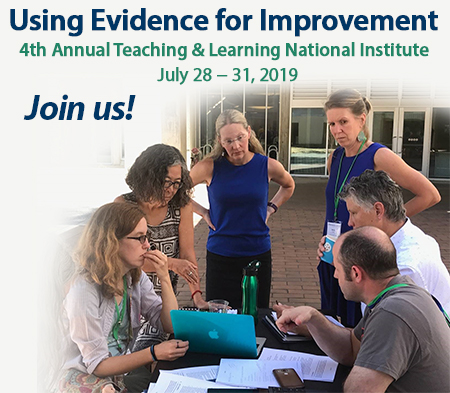Are you using your NSSE data to maximum advantage, specifically to study and create more equitable, high-quality learning and teaching experiences? If not, bring your team to an intensive, adult summer camp on the Puget Sound — the 4th annual Using Evidence to Improve: Teaching and Learning National Institute (TLNI). Apply now!
NSSE will co-sponsor, Using Evidence to Improve: TLNI, July 28-July 31, 2019, in partnership with the National Institute for Learning Outcomes Assessment (NILOA), the Washington Center for Improving Undergraduate Education, and Washington State Board for Community and Technical Colleges (WSBCTC).
For the past three years, TLNI has brought together teams of faculty, student affairs professionals, institutional researchers, and administrators to foster data-informed change initiatives that improve the quality of students' experiences in courses and educational activities across the curriculum-- leading to improvements in student engagement, retention and graduation, and learning outcomes. With a mix of plenaries, concurrent sessions, team time, and small- and large group sessions facilitated by experienced educators from across the country, this residential institute, held at The Evergreen State College, provides a learning space for campus teams to use evidence to develop plans that can guide the work of examining, improving, and supporting what happens in learning contexts across their campuses. Teams work intensively on their campus action plans, with time to run or walk on the college's network of forested trails, or on the Evergreen beach, and maybe even see a Geoduck.
The institute registration fee of $1,375 (if you apply before April 1, 2019) covers 4 nights lodging on-campus housing, meals, workshops, sessions, plenaries, and materials.
At previous TLNIs, institution teams engaged in a variety of evidence use projects featuring NSSE results, including:
- Boise State University, which focused on increasing data use via their new data sharing platforms, in particular, using student engagement data to inform program level improvements.
- Thompson Rivers University designed a range of plans to share data across campus and to increase their commitment to the Scholarship of Teaching and Learning and to faculty development. Teams are encouraged to use a variety of forms of evidence in their action plans.
- The Saint Mary's University team used NSSE to inform a comprehensive communication strategy for new students and to develop a first-year experience.
- The team from Evergreen State College brought together student and academic affairs to develop an effective and equitable first-year experience.
- Eastern Washington University focused on faculty development and their use of assessment data to improve teaching and learning.
- Western Carolina University focused on high-impact practices (HIPs), using their NSSE results to examine students' participation and faculty importance and to design enriched HIPs.
- Western Michigan University developed a plan for new approaches to share assessment data with faculty and to coordinate institutional efforts to use data to inform student success efforts. In one way or another, all of the teams focused on using evidence to identify areas of the student experience that could be strengthened and then--building on what is known about successful practices--to shape more effective approaches both in and outside the classroom.
Teams at the Institute are guided by a conceptual model for Using Evidence for Improvement that includes mutual emphasis on student learning outcomes, data and evidence, and professional development.
The invitation to apply for the fourth annual TLNI is on the NSSE website and also on the Washington Center site: http://wacenter.evergreen.edu/teaching-and-learning-national-institute


